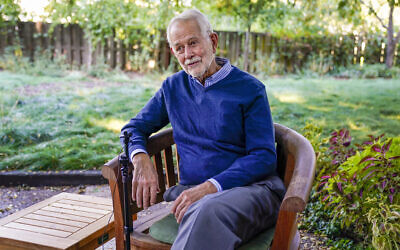Jewish American professor Paul Milgrom couldn’t immediately be reached Monday on the phone by the Nobel Prize Committee to inform him that he had won the prestigious award in economics, so it resorted to a creative solution.
Instead of the traditional call, Milgrom received the news via a knock on his door in the middle of the night by his colleague and neighbor Robert Wilson, who won the prize along with him this year.
The Stanford University duo received the Nobel prize in economics for helping make auctions run more efficiently.
Wilson, 83, was once Milgrom’s PhD adviser, and the two also happen to be neighbors. Reached by phone at his home in California, Milgrom, 72, said he received news of their win “in a strange way.”
“I got a knock at my door from Bob Wilson,” he told The Associated Press.
Security camera footage at Milgrom’s home captured the moment.
The #NobelPrize committee couldn’t reach Paul Milgrom to share the news that he won, so his fellow winner and neighbor Robert Wilson knocked on his door in the middle of the night. pic.twitter.com/MvhxZcgutZ
— Stanford University (@Stanford) October 12, 2020
Wilson knocked on Milgrom’s door in the dead of night and spoke into the intercom. “Paul,” he said. “It’s Bob Wilson. You’ve won the Nobel Prize.”
Awakened, Milgrom stammered for a moment and then said: “Wow.”
Stanford University said in a tweet that Wilson rang Milgrom’s doorbell at 2:15 a.m., adding that Milgrom’s wife, who was in Stockholm, had received a security-camera notification on her phone. She got to watch live as Wilson told Milgrom he’d won.

Paul R. Milgrom, professor at Stanford University, speaks during an interview about winning the Nobel Prize in economics at his home in Palo Alto, California, October 12, 2020. (AP Photo/Tony Avelar)
The Nobel Committee said the pair “have benefited sellers, buyers and taxpayers around the world.”

Robert B. Wilson, a professor at Stanford University, during an interview about winning the Nobel Prize in economics at his home in Palo Alto, California, October 12, 2020. (AP Photo/Tony Avelar)
The two men tackled the tricky problem of making auctions work efficiently. The committee said Wilson’s work showed “why rational bidders tend to place bids below their own best estimate of the common value” — which could mean the item goes for less than it’s worth and perhaps not to the buyer who most wants it, neither of which is supposed to happen if the auction is working properly.
“Auctions ask and answer the most fundamental questions in economics: Who should get the goods and at what prices?’’ said economist Peter Cramton, a former student of Wilson’s now at the University of Maryland and the University of Cologne in Germany. The winners’ work provides guidance about “how to price and allocate scarce goods — radio spectrum, electricity, financial securities, and many more.”
Speaking to reporters in Stockholm via a telephone link, Wilson said the announcement had been “very happy news,” conceding that despite his research focus he himself had “never participated in an auction.”
However, he quickly had to retract his statement.
“My wife is pointing out that we bought ski boots on eBay, I guess that was an auction,” Wilson said.
 RSS Feed
RSS Feed















 October 13th, 2020
October 13th, 2020  Awake Goy
Awake Goy  Posted in
Posted in  Tags:
Tags: 













